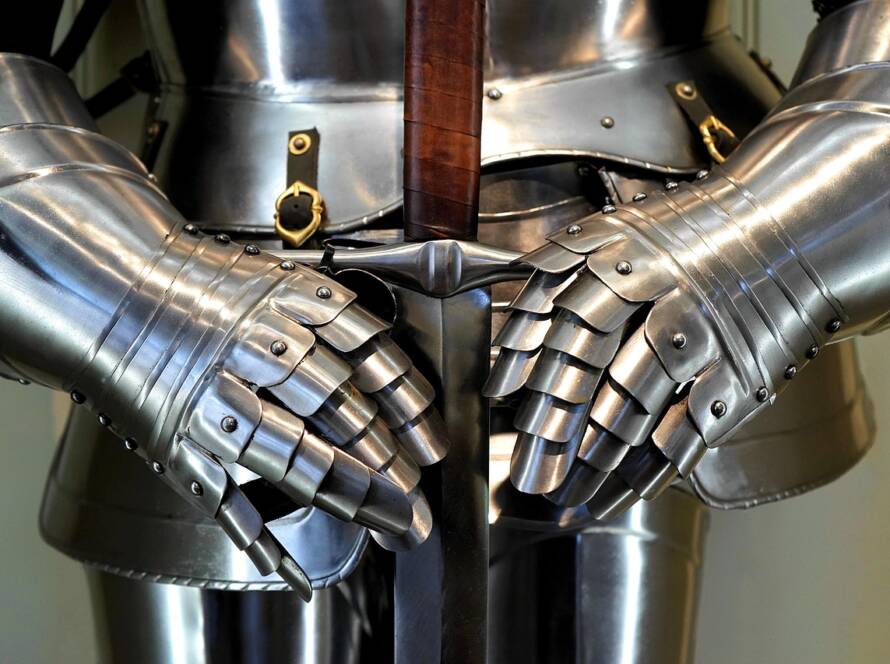The reformation continues. In the years between Hus and Luther there arose another figure of great importance, William Tyndale. He learned Greek so that he might translate the Word of God in the New Testament from the original language into English. You and I have our Bibles today because of the perseverance and hard work of William Tyndale. His English New Testament is certainly one of the most important books ever published in the English language.
Tyndale, while in attendance at a meeting with priests and bishops said that he “defied the Pope and all his laws” and vowed that “a plough-boy would know more of the Scriptures than they.” He was condemned as a blasphemer and heretic and burnt at the stake.
As the Word of God spread, and God continued moving upon men to proclaim the truth of the gospel, on the Eve of All Saints Day, October 31, 1517 (Reformation Day), a momentous and incredible event took place at the Church in Wittenberg, Germany, in fulfillment of Hus earlier prophecy. There this Roman Catholic monk named Martin Luther, the swan, challenged the leaders of the church that had burned the goose to a debate. He did so in the form of a protest.
Luther had long been studying the Scriptures and wrestled with trying to gain his salvation by his own achievement, hard works and even self torture. Later on, having been regenerated by the Spirit of God was given understanding as to what the Scriptures taught about sin, salvation, and especially about the justification of lost sinners by faith alone in Jesus Christ. He came to see, as had Wycliffe and Hus, that the sole authority for the church was the Word of God.
Describing his own conversion, Luther wrote:
At last, by the mercy of God, meditating day and night, I gave heed to the context of the words, namely, “In this the righteousness of God is revealed, as it is written, ‘The just shall live by faith’.” There I began to understand that the righteousness of God is that by which the righteous lives, by a gift of God, namely by faith. And this is the meaning: the righteousness of God is revealed by the gospel, God justifies us by faith, as it is written, “The just shall live by faith.” Here I felt that I was altogether born again and had entered paradise itself through open gates.
As Luther reacted against and protested the selling of indulgences (money paid to the church for the forgiveness of sins) and many other abuses by the church – things that he saw the church doing that clearly contradicted the teachings of Holy Scripture – he made a list. His list of 95 offenses or abuses, which are referred to as Luther’s 95 Theses was an indictment of the church and many of its tradition and practices.
In challenging the church, he wanted a public debate, and so took and nailed his list to the church door at Wittenberg. He made a public protest by posting this in such a way. It was a public statement about the condition of the church and its relation to the truth of Holy Scripture.
In response he was put on trial and challenged to recant of his theses, which the church court saw as heresy. He challenged their ultimate and infallible authority to interpret the Word of God for the people. At this trial, know as the Diet of Worms, Luther stood his ground. In fact, his final reply to the command to recant was an absolute appeal to the authority of Scripture alone as his guide in matters of faith. Luther was asked by the court:
Do you wish to defend the books which are recognized as your work? Or to recant anything contained in them? . . .
He concluded his reply by saying:
\”You demand a simple answer. Here it is, plain and unvarnished. Unless I am convinced by Scripture or by plain reason (for I do not accept the authority of popes or councils, for they have often contradicted each other), my conscience is captive to the Word of God. I cannot and I will not recant anything, for to go against conscience is neither right nor safe. Here I stand, I cannot do otherwise, God help me. Amen.
As history unfolded around him, that date and time at that church door have become the spark that brought fires of renewal to the church and freed to the gospel from the clutches of the cultic church controlled by Rome and the Pope. This spark, this birth of a protest against the abuses of the Church, is known to us today still as the Protestant Reformation.
This turning point in history has given us many rich traditions and doctrines. The foundation of the Reformation of course is the doctrine of justification by faith alone. This truth sprung forth from the cornerstone, the conviction that God’s Word, the Holy Scriptures, was itself the sole infallible authority for life and faith, for salvation and Christian living, for the church and the world.
There is much that Luther had to fight against in order to have this reformation, which by God\’s grace and providence brought restoration to the foundation of christian doctrines; namely the apostle\’s doctrines. We will see them in more details in our next articles.




